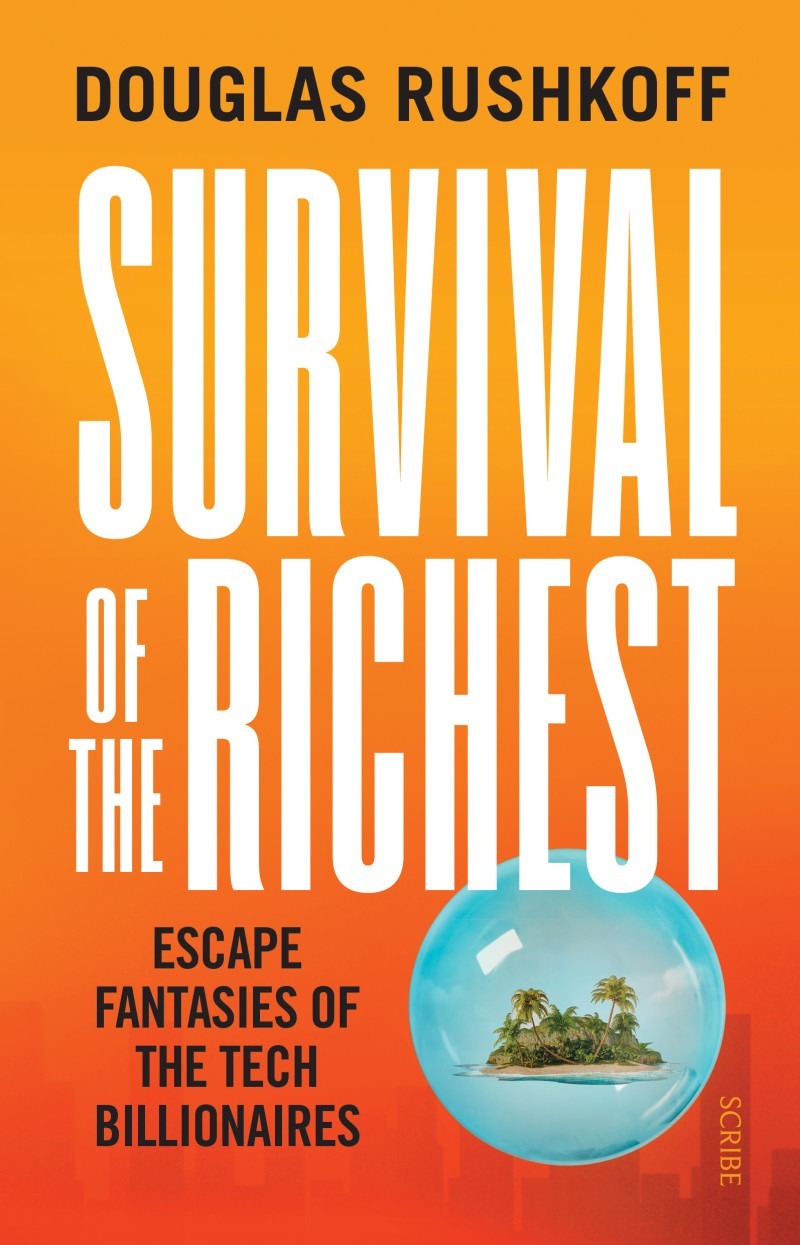
Survival of the Richest: Escape fantasies of the tech billionaires (Scribe) by Douglas Rushkoff
It’s difficult for a book to live up to the racy subtitle “Escape Fantasies of the Tech Billionaires”. This is the problem with which professor of media theory and digital economics Douglas Rushkoff saddles himself. His book, entertaining and necessary though it is, never quite lives up to its marketing. The subject is tech billionaires and “The Mindset” with which they tackle the problems of the world. In the author’s eyes, The Mindset is the belief that with enough money, the elite can leave behind the messy debris of real life and start afresh, either in the real world or in some kind of virtual reality. He phrases it elsewhere as “the Insulation Equation”: can the tech titans “earn enough money to insulate themselves from the reality they were creating by earning money in this way?” Hence Mark Zuckerberg’s Metaverse and the attempts made by both Elon Musk and Jeff Bezos to blast themselves into space.
Rushkoff is onto something here, and he has great fun skewering the pomposity of these men. “It’s as if they want to build a car that goes fast enough to escape from its own exhaust,” he writes. He quotes psychedelics professor Timothy Leary who observed, back in 1990, that the architects of our digital future were male nerds attempting to create something like their idea of a perfect woman: “a predictive algorithm could anticipate their every need in advance and deliver it directly, removing every trace of friction and longing”. At no point in the book are you in any doubt as to where Rushkoff stands. His villains are so cartoonish that we remain on his side, but there is sometimes a little too much scorn and not enough substance.
Survival of the Richest includes pertinent paragraphs about Covid-19, underlining both the extent to which the super-rich could simply exist happily in their own bubbles and the fact that the conditions of the pandemic not only made billionaires richer but also produced brand-new billionaires. The unprecedented disruption was proof that if the richest people in the world didn’t want to interact with the poorest, they simply didn’t have to.
Rushkoff is right not to trust the heads of the “technopoly”, who conquer, colonise and dominate. Theirs is a brutal quest for progress, valuing technology over people. “The experience of wealth and power is akin to removing the part of the brain ‘critical to empathy and socially appropriate behaviour’,” the author writes.
This is all well and good – or all well and terrible, rather – but, given that Rushkoff’s book begins with an enticing story in which he speaks at a “super-deluxe resort” to five ultra-wealthy tech bros who talk to him surprisingly candidly about their underground bunkers, it’s a little pale by comparison. This opening hints at the insight and detail about the “escape fantasies” that we hope the book will provide. But as it proceeds, we get a passionate screed against Silicon Valley rather than an exclusive look at the ways tech billionaires are trying to dodge death.
We’ve got ourselves into a huge amount of trouble, Rushkoff thinks, and the people really running things want us never to get off the treadmill, generating more content, earning more money. Their goal is the “relentless pursuit of growth” – growth never questioned by the population at large. As speed becomes more important than anything else, AIs now increasingly carry out work that humans could or should – and the tech giants have become terrified of the potentially superior intelligence they have helped to create. Rushkoff’s take on the whole affair is a weary and comic one, but there is also real sadness. The world, he thinks, could have been so much better than this.
The book’s proposed solutions have been criticised for not being sufficiently radical. But Rushkoff wouldn’t argue that they were radical. What’s necessary, he writes, is a return to a pre-Mindset metabolism; de-prioritisation of growth; slowing down. Reject growth for growth’s sake, embrace community action, and stop making the ultra-rich even richer. “There is no escape, and there is no later,” he ends the book by saying. “If we’re not doing it at the moment, we’re not doing it at all.”
This piece is from the New Humanist spring 2023 edition. Subscribe here.

